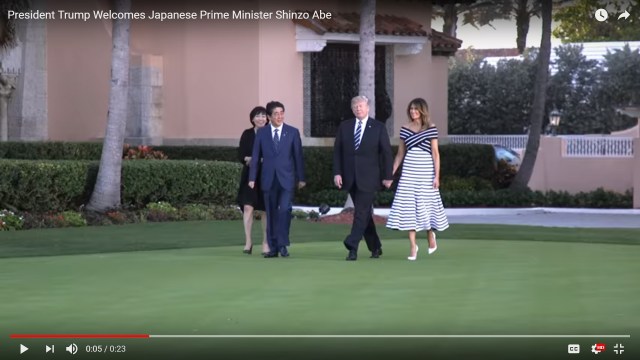
Despite the “fake news”, the Japanese are glad that it was not a sign of a deteriorating political relationship.
Last week, the U.S. newspaper The Washington Post reported that President Trump allegedly brought up Pearl Harbor during trade talks with Japanese Prime Minister Shinzo Abe in June this year. The Post implied that the comment was meant as a reminder to Abe about the “atrocities” America experienced at the hands of the Japanese, and said it was part of an overall “rant” about the trade deficit between the U.S. and Japan.
The Post indicated that this was a troublesome sign of a deteriorating political relationship between President Trump and PM Abe, who otherwise appeared to be on very good terms. This was disquieting news for all, since the U.S. and Japan rely on each other substantially for political and economic reasons. The two countries have a strong trade relationship, in spite of the trade deficit, and the two leaders are said to be genuine friends.
Japan, in particular, benefits greatly from their relationship with the U.S., whose military presence in Japan contributes to the maintenance of the tenuous peace in the Pacific. The U.S. is also one of the chief suppliers of aid to the country during natural disasters, and the U.S. Armed Forces regularly contribute manpower and resources toward disaster relief efforts.
That’s why the Japanese media fell into a bit of a panic when it picked up the Washington Post‘s report. While most individual netizens actually took the news with a grain of salt, many Japanese news sites and officials began to worry that the U.S. and Japan were in fact not getting along well at all, and feared what might happen as a result.
▼ A U.S. Marine Corps recruiting video about their work in Operation Tomodachi, a U.S. Armed Forces mission to provide relief after the 2011 Great East Japan Earthquake and Tsunami
“Many are starting to doubt the credibility of Prime Minister Abe [who has said that U.S.-Japan relations are stronger than ever]”, said one news source, while Yuichiro Tamaki, leader of the Democratic Party for the People said, “It looked like the relationship between Trump and Abe was good, but now it’s being revealed that things are quite cold.” Others worried about what kind of pressure President Trump may put on Japan to get Abe to lower the U.S. trade deficit.
Now, though, Japanese news source Sankei News has reported that, according to a high-ranking Japanese official, Trump’s “I remember Pearl Harbor” statement was actually made at a completely different time and place. The mention of Pearl Harbor was allegedly a joke about Japan’s “strength” in relation to Abe’s golfing talent, which Trump made before starting up a game at his Mar-a-Lago golf course in Florida, two months before.
▼ Footage of Abe and Trump’s meeting at the White House before their joint trip to Florida
Many Japanese netizens are now criticizing the Washington Post and Japanese media for spreading “fake news”, and are complaining about the credibility of the media in general:
“Is there any media that we can trust?”
“This is the way it is now.”
“They got us!”
“I guess every country’s media is shit.”
“Of course it’s fake news. I’m not even surprised.”
“They must be so embarrassed.”
“Idiots.”
“It should be a crime to spread fake news.”
But while Japanese netizens are critical of the whole conundrum, Japanese officials and news sources who must have sincerely believed the unsettling information they were reporting can now sigh in relief, as the two countries seem to be on as excellent terms as ever, in spite of some economic differences. With rising tensions and shaky relationships between international leaders across the world, for once the unveiling of misreporting is actually good news.
Source: Sankei News via Hamster Sokuhou
Images: YouTube/The White House

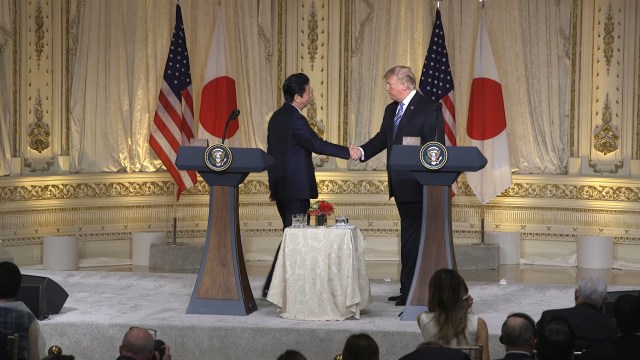
 What do Japanese netizens think about President Trump’s “I remember Pearl Harbor” comment?
What do Japanese netizens think about President Trump’s “I remember Pearl Harbor” comment? Prime Minster Abe tells Trump that imperial succession is “100 times bigger” than the Super Bowl
Prime Minster Abe tells Trump that imperial succession is “100 times bigger” than the Super Bowl Japanese right-wing nationalists send a message to Donald Trump in Japan
Japanese right-wing nationalists send a message to Donald Trump in Japan Donald Trump meets Pen-Pineapple-Apple-Pen singer Piko Taro in Japan
Donald Trump meets Pen-Pineapple-Apple-Pen singer Piko Taro in Japan Trump’s announcement of America-Japan joint space exploration hypes up Japanese netizens
Trump’s announcement of America-Japan joint space exploration hypes up Japanese netizens Red light district sushi restaurant in Tokyo shows us just how wrong we were about it
Red light district sushi restaurant in Tokyo shows us just how wrong we were about it Japanese ramen restaurants under pressure from new yen banknotes
Japanese ramen restaurants under pressure from new yen banknotes McDonald’s new Happy Meals offer up cute and practical Sanrio lifestyle goods
McDonald’s new Happy Meals offer up cute and practical Sanrio lifestyle goods Starbucks Japan adds a Motto Frappuccino to the menu for a limited time
Starbucks Japan adds a Motto Frappuccino to the menu for a limited time Tokyo Tsukiji fish market site to be redeveloped with 50,000-seat stadium, hotel, shopping center
Tokyo Tsukiji fish market site to be redeveloped with 50,000-seat stadium, hotel, shopping center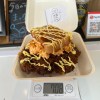 Sandwiches fit for a sumo served up in Osaka【Taste Test】
Sandwiches fit for a sumo served up in Osaka【Taste Test】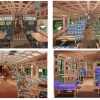 Beautiful Red and Blue Star luxury trains set to be Japan’s new Hokkaido travel stars
Beautiful Red and Blue Star luxury trains set to be Japan’s new Hokkaido travel stars Akihabara pop-up shop sells goods made by Japanese prison inmates
Akihabara pop-up shop sells goods made by Japanese prison inmates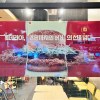 We tried Korea’s way-too-big King Tonkatsu Burger at Lotteria 【Taste Test】
We tried Korea’s way-too-big King Tonkatsu Burger at Lotteria 【Taste Test】 Pokémon Sleep camping suite and guestrooms coming to Tokyo Hyatt along with giant Snorlax burgers
Pokémon Sleep camping suite and guestrooms coming to Tokyo Hyatt along with giant Snorlax burgers All-you-can-drink Starbucks and amazing views part of Tokyo’s new 170 meter-high sky lounge
All-you-can-drink Starbucks and amazing views part of Tokyo’s new 170 meter-high sky lounge More foreign tourists than ever before in history visited Japan last month
More foreign tourists than ever before in history visited Japan last month French Fries Bread in Tokyo’s Shibuya becomes a hit on social media
French Fries Bread in Tokyo’s Shibuya becomes a hit on social media Studio Ghibli releases new action figures featuring Nausicaä of the Valley of the Wind characters
Studio Ghibli releases new action figures featuring Nausicaä of the Valley of the Wind characters New private rooms on Tokaido Shinkansen change the way we travel from Tokyo to Kyoto
New private rooms on Tokaido Shinkansen change the way we travel from Tokyo to Kyoto Starbucks reopens at Shibuya Scramble Crossing with new look and design concept
Starbucks reopens at Shibuya Scramble Crossing with new look and design concept Studio Ghibli glasses cases let anime characters keep an eye on your spectacles
Studio Ghibli glasses cases let anime characters keep an eye on your spectacles Beautiful Ghibli sealing wax kits let you create accessories and elegant letter decorations【Pics】
Beautiful Ghibli sealing wax kits let you create accessories and elegant letter decorations【Pics】 Studio Ghibli releases Kiki’s Delivery Service chocolate cake pouches in Japan
Studio Ghibli releases Kiki’s Delivery Service chocolate cake pouches in Japan New definition of “Japanese whiskey” goes into effect to prevent fakes from fooling overseas buyers
New definition of “Japanese whiskey” goes into effect to prevent fakes from fooling overseas buyers Our Japanese reporter visits Costco in the U.S., finds super American and very Japanese things
Our Japanese reporter visits Costco in the U.S., finds super American and very Japanese things Studio Ghibli unveils Mother’s Day gift set that captures the love in My Neighbour Totoro
Studio Ghibli unveils Mother’s Day gift set that captures the love in My Neighbour Totoro New Japanese KitKat flavour stars Sanrio characters, including Hello Kitty
New Japanese KitKat flavour stars Sanrio characters, including Hello Kitty New Pokémon cakes let you eat your way through Pikachu and all the Eevee evolutions
New Pokémon cakes let you eat your way through Pikachu and all the Eevee evolutions Disney princesses get official manga makeovers for Manga Princess Cafe opening in Tokyo
Disney princesses get official manga makeovers for Manga Princess Cafe opening in Tokyo Sales of Japan’s most convenient train ticket/shopping payment cards suspended indefinitely
Sales of Japan’s most convenient train ticket/shopping payment cards suspended indefinitely Sold-out Studio Ghibli desktop humidifiers are back so Totoro can help you through the dry season
Sold-out Studio Ghibli desktop humidifiers are back so Totoro can help you through the dry season Japanese government to make first change to romanization spelling rules since the 1950s
Japanese government to make first change to romanization spelling rules since the 1950s Ghibli founders Toshio Suzuki and Hayao Miyazaki contribute to Japanese whisky Totoro label design
Ghibli founders Toshio Suzuki and Hayao Miyazaki contribute to Japanese whisky Totoro label design Doraemon found buried at sea as scene from 1993 anime becomes real life【Photos】
Doraemon found buried at sea as scene from 1993 anime becomes real life【Photos】 Tokyo’s most famous Starbucks is closed
Tokyo’s most famous Starbucks is closed One Piece characters’ nationalities revealed, but fans have mixed opinions
One Piece characters’ nationalities revealed, but fans have mixed opinions We asked a Uniqlo employee what four things we should buy and their suggestions didn’t disappoint
We asked a Uniqlo employee what four things we should buy and their suggestions didn’t disappoint Princesses, fruits, and blacksmiths: Study reveals the 30 most unusual family names in Japan
Princesses, fruits, and blacksmiths: Study reveals the 30 most unusual family names in Japan Survey reveals that Australian people trust Japan and Prime Minister Abe to act responsibly
Survey reveals that Australian people trust Japan and Prime Minister Abe to act responsibly Pen-Pineapple-Apple-Pen singer to dine with President Trump, Prime Minster Abe during state visit
Pen-Pineapple-Apple-Pen singer to dine with President Trump, Prime Minster Abe during state visit Anti-Japanese protestors “execute” effigy of Prime Minister Abe with ISIS-style beheading 【Video】
Anti-Japanese protestors “execute” effigy of Prime Minister Abe with ISIS-style beheading 【Video】 Station lockers around Tokyo start closing from today due to upcoming Trump visit to Japan
Station lockers around Tokyo start closing from today due to upcoming Trump visit to Japan Former PM Taro Aso celebrates Obama’s visit with one of his typically inappropriate comments
Former PM Taro Aso celebrates Obama’s visit with one of his typically inappropriate comments The hamburger Trump ate in Japan sells out as diners track down the presidential meal
The hamburger Trump ate in Japan sells out as diners track down the presidential meal Japanese Twitter users surprised that the Foreign Minister did something cool
Japanese Twitter users surprised that the Foreign Minister did something cool Japanese TV broadcaster captions Donald Trump’s sumo speech in Tokyo as just “English”
Japanese TV broadcaster captions Donald Trump’s sumo speech in Tokyo as just “English” Japanese boy band pop star celebrates Donald Trump’s visit to Japan with Trump cosplay【Photos】
Japanese boy band pop star celebrates Donald Trump’s visit to Japan with Trump cosplay【Photos】 Japanese Prime Minister Shinzo Abe announces resignation
Japanese Prime Minister Shinzo Abe announces resignation Hayao Miyazaki speaks out against relocation of Okinawa U.S. base, criticizes Prime Minister Abe
Hayao Miyazaki speaks out against relocation of Okinawa U.S. base, criticizes Prime Minister Abe Donald Trump will probably be the first foreign leader to meet with Japan’s new emperor
Donald Trump will probably be the first foreign leader to meet with Japan’s new emperor Political commentator says Donald Trump supporters whack off to anime 【Video】
Political commentator says Donald Trump supporters whack off to anime 【Video】 Cute photos of Japanese Prime Minister Shinzo Abe enjoying ice cream cone make netizens smile
Cute photos of Japanese Prime Minister Shinzo Abe enjoying ice cream cone make netizens smile
Leave a Reply